Australian policymakers should follow the UK government’s lead by investing in artificial intelligence and data science conversion courses for our top graduates as the fastest way to create a pool of AI talent across the economy, according to UNSW scientia professor Toby Walsh.
The UK government last week said it would spend up to 24 million (A$44 million) to create 2500 new places – including 1,000 scholarships for potential students from underrepresented backgrounds – to help bolster the introduction of new and diverse talent into digital and tech roles.
The program in the UK is a collaboration between the government, universities and industry, and was designed to fast-track the introduction of critical data science skills across different sectors of the economy. And we should be doing the same thing here, says Prof Wash, who is a leading global thinker on the application of artificial intelligence.

The UK program will provide places for graduates from a range of backgrounds – both those that have a degree in science, technology, engineering, maths or social sciences, as well as those that have studied other subjects to date.
Graduates will have the opportunity to apply for a place on new artificial intelligence (AI) and data science masters courses starting in the northern hemisphere’s autumn 2020, the UK’s Digital Secretary Oliver Dowden said last Wednesday.
The program will enable 2,500 people to develop new digital skills or retrain to help find new employment in the UK’s cutting-edge AI and data science sectors.
Prof Walsh said the biggest obstacle to the broader adoption of productivity improving AI and data science tools was access to talent.
“A policy like this is important as the most important asset to profit from the AI revolution is human talent. These are tools that still require advanced skills to operate,” Prof Walsh told InnovationAus.
“The major bottleneck for firms to adopt AI is access to people who know how to drive the technology,” he said.
A PWC report in 2017 estimated they were less than 100,000 people on the planet with a PhD in AI.
“So the UK is making a smart and cheap investment in growing more talent in this space. Australia could and should do the same. This was one of the half dozen findings in the Horizon Scanning exercise on AI that I chaired for ACOLA.”
Prof Walsh said that whilst governments needed to kick-start the economy now more than ever after the pandemic, that they tended to spend on roads, transport and other physical infrastructure – projects which can often over-run budgets and provide little return despite the massive investment.
“For example, the highway upgrade between Geelong and Colac is expected to yield a return of just eight cents for each dollar spent,” he said.
“On the other hand, for every $1 the government spends on science and technology, it gets $5 or more back. We need to innovate our way out of recession. Not only does it make economic sense, it will also be kinder on the planet.”
Do you know more? Contact James Riley via Email.

